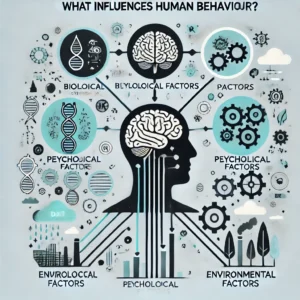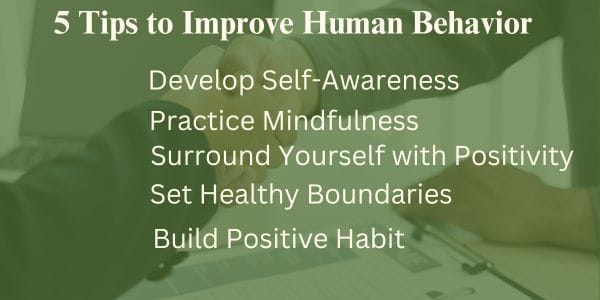Human Behaviour
Dive into the fascinating realm of human behaviour, examining the influences of biology, emotions, social dynamics, and life experiences on how individuals act and react in various situations. Human behaviour includes both deliberate choices and automatic reactions, shaped by educational influences and environmental conditions.
Disclaimer:~The information provided in this blog is for informational purposes only. It is not intended as a substitute for professional advice. Always seek the guidance of a qualified expert with any concerns regarding mental health or behavior.
Obtain an understanding of the fundamental reasons influencing our behaviours. What prompts our behaviours? What factors influence our choices, feelings, and social engagements? Acquiring an understanding of human behaviour is paramount for personal growth, cultivating meaningful relationships, and attaining success. This guide delves into the determinants of human conduct, prevalent behavior patterns, and scientifically supported strategies for enhancing your mindset and habits.
“Behaviour is the mirror in which everyone shows their image.” – Johann Wolfgang von Goethe
Also Read an Article on Mirror neurons on Harvard’s research on empathy
What Influences Human Behaviour?

Human behaviour is shaped by an intricate combination of biological, psychological, and environmental influences. Let’s break it down:
Biological Factors
- Genetics: Your DNA shapes personality traits, intelligence, and tendencies.
- Brain Chemistry: Neurotransmitters (Neurotransmitters are chemical messengers that transmit signals between nerve cells, enabling communication in the brain and body. They regulate critical functions like mood, memory, emotions, and muscle control, and dopamine affects motivation and happiness.
- Evolutionary Instincts: Behaviours like fear and social bonding are hardwired for survival.
Psychological Factors
- Cognitive Biases: Mental shortcuts influence decisions, often subconsciously.
- Emotions: Feelings like anger, joy, or fear can drive behaviour.
- Past Experiences: Childhood and life events shape how you perceive and respond to the world.
Environmental Factors
- Cultural Norms: Social rules dictate behaviours in various settings.
- Peer Influence: Surrounding yourself with positive or negative people impacts your actions.
- Technology: Social media and digital trends heavily influence behaviour today.
Also Read :-Social Values
Related study:~Neurotransmitters and brain chemistry
A neuroscience or psychology source
5 Tips to Improve Human Behaviour

Develop Self-Awareness
- Self-awareness is key to understanding human behaviour and improving personal growth.
- Recognizing your thoughts, emotions, and actions helps you make better decisions and build stronger relationships.
- Developing self-awareness enhances emotional intelligence, a critical aspect of human behaviour.
- Regular reflection and mindfulness are effective ways to cultivate self-awareness and understand behavioural patterns.
- By improving self-awareness, you gain insight into your strengths and weaknesses, driving positive changes in human behaviour.
Practice Mindfulness
- Practice mindfulness to enhance focus and balance in daily life, improving overall mental well-being.
- Mindfulness techniques, like meditation and deep breathing, help reduce stress and promote emotional stability.
- Being mindful of your thoughts and actions improves self-awareness, a cornerstone of healthy human behaviour.
- Regular mindfulness practice fosters a positive mindset and better management of negative emotions.
- Embracing mindfulness in your routine leads to greater clarity, peace, and meaningful interactions with others.
Surround Yourself with Positivity
- Surround yourself with positivity to improve your mindset and enhance overall human behaviour.
- Being around supportive, optimistic people helps build confidence and reduce stress.
- Positive environments foster emotional resilience, motivation, and a constructive approach to challenges.
- Limit exposure to negativity and focus on relationships that uplift and inspire personal growth.
- Cultivating positivity around you encourages better decision-making, productivity, and a fulfilling life.
Set Healthy Boundaries
- Set healthy boundaries to protect your well-being and improve human behaviour in relationships.
- Boundaries help define your personal limits, ensuring mutual respect and emotional balance.
- Clear boundaries promote better communication and reduce feelings of stress or resentment.
- By setting boundaries, you prioritize self-care while maintaining respectful connections with others.
- Healthy boundaries empower you to focus on personal growth and nurture meaningful, positive relationships.
Build Positive Habit
- Build positive habits to improve your mindset and enhance human behavior for long-term success.
- Consistent positive actions, like exercising and journaling, shape a healthier and more productive lifestyle.
- Developing good habits boosts self-discipline, emotional resilience, and overall well-being.
- Start small with achievable goals to create lasting changes that align with your personal values.
- Positive habits inspire confidence, better decision-making, and meaningful growth in daily life.
Fascinating Facts About Human Behaviour
- Mirror Neurones Drive Empathy: Humans are hardwired for connection—mirror neurones in the brain allow us to feel and reflect others’ emotions, making empathy a natural instinct.
- Body Language Speaks Louder: Over 55% of communication is nonverbal, meaning gestures, posture, and facial expressions often reveal more than words.
- The Power of Habits: Studies show that nearly 40% of daily actions are habitual, emphasizing how routines shape human behaviour and decision-making.
- Negativity bias is real: humans are naturally more sensitive to negative experiences, a survival trait from our ancestors to detect and avoid threats.
- Eye Contact Builds Trust: Making eye contact for 60–70% of a conversation fosters trust and connection, signalling attentiveness and honesty.
- Emotions Are Contagious: Positive or negative emotions can spread like wildfire in groups, influencing overall mood and behaviour.
- Humans Seek Belonging: The need for social acceptance is so strong that social rejection activates the same brain regions as physical pain.
- Decisions Happen Fast: The brain often makes decisions within milliseconds, relying on subconscious processing before conscious thought kicks in.
- Procrastination Isn’t Laziness: It’s a behavioural response to stress or fear of failure, not a lack of willpower.
- Kindness Is Rewarding: Acts of kindness trigger the release of serotonin and dopamine, creating a “helper’s high” that boosts happiness.
Human behaviour is as fascinating as it is complex, revealing the intricate ways we connect with ourselves and the world around us.
Why Understanding Human Behaviour Matters
- Workplace Conflict Resolution: Understanding human behaviour helps a manager address disputes effectively. For example, by identifying that one employee thrives on structure while another prefers flexibility, the manager assigns tasks accordingly, improving teamwork and productivity.
- Marketing Strategies: Companies like Amazon leverage insights into human behaviour to personalize recommendations. By analysing customer preferences, they boost satisfaction and sales, showing how behaviour-driven strategies lead to success.
- Parenting Challenges: A parent observing their child’s tantrums might recognize a behavioural need for autonomy. Offering choices instead of enforcing strict rules aligns with the principles of human behaviour, fostering better cooperation.
- Traffic Management: Urban planners rely on human behaviour studies to design safer roads. For instance, roundabouts are implemented in areas where drivers naturally slow down, reducing accidents significantly.
- Healthcare Communication: Doctors who understand human behaviour use empathetic communication to address patients’ emotional responses, ensuring they feel supported and reducing anxiety for better health outcomes.
- Customer Service: By understanding human behaviour, a hotel clerk can manage an angry guest by listening actively and showing empathy, turning a negative experience into a positive one and retaining the customer’s loyalty.
- Social Campaigns: Anti-smoking ads use behavioural psychology by leveraging fear-based imagery, aligning with insights about human behaviour to discourage unhealthy habits effectively.
- Team Leadership: A sports coach who tailors their feedback—praise for some players and constructive criticism for others—applies principles of human behaviour to enhance team performance and morale.
Also read:-A psychology site like Psychology Today or APA
Understanding human behaviour is vital in these real-world examples, as it helps improve relationships, decision-making, and outcomes. By applying behavioural insights, individuals and organizations can navigate challenges effectively and foster growth.
Understanding human behaviour is the key to unlocking the intricacies of our actions, relationships, and decisions. It allows us to connect more deeply with others, navigate challenges effectively, and foster empathy in a world that thrives on collaboration. By observing, learning, and applying these insights, we can not only improve our own lives but also positively influence those around us. Whether in personal growth, professional success, or societal harmony, the study of human behaviour is a powerful tool that reminds us of our shared humanity and infinite potential for transformation.
Let’s make it different. Leave comments

